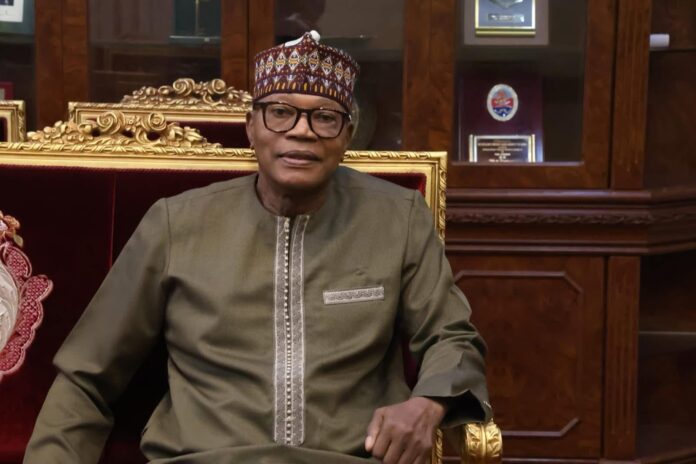By Alieu Famara Sagnia
As Gambians seek to revive the stalled process for adoption of a new national constitution, the veteran Ghanaian diplomat, Dr Mohamed Ibn Chambas, is back in the country as the troubleshooter.
It would be recalled that Ghana under Jerry Rawlings helped the Gambian authorities to produce a new Constitution 1997, following the 1994 military takeover in the country.
That constitution, among other things, reportedly provided for a two-term limit for the president, and for winning by at the very least 51 percent to avoid a second round in presidential elections.
Yahya Jammeh had subsequently tampered with and amended several times the 1997 Constitution, including to remove the term-limit provision – which it must be pointed out was also absent in the previous 1970 Constitution, and so enabled the first president, Sir Dawda Kairaba Jawara, to stay in power for 34 years.
Jammeh also re-introduce the first-past-the-post system, which was also provided for in the original 1970 Republican constitution, and would subsequently win every election and stayed in power for 22 years.
Ibn Chambas first came to The Gambia as Ghana’s foreign minister and envoy of Jerry Rawlings, following the 22 July 1994 coup led by Yahya Jammeh.
In assisting the new military leaders in Banjul to settle down, the Rawlings government helped the AFPRC junta produce the 1997 Constitution.
However, In the presidential election held in December 2016, Jammeh lost to the opposition coalition candidate, Adama Barrow.
Chambas as UN Representative for West Africa and the Sahel was back again in Banjul during the “impasse”, when Yahya Jammeh after conceding defeat changed his mind within days, and asked for a re-run of the election claiming that it was rigged.
Chambas as UN envoy participated in the ECOWAS-led mediation efforts headed by the Liberian President Ellen Johnson Sirleaf to defuse the crisis.
The mediators included Guinean President Alpha Conde and Mauritanian President at the time, who were seen as close confidantes and trusted by Jammeh.
They succeeded in persuading Jammeh to vacate the State House in Banjul and go into exile in Equatorial Guinea, and thus prevented an ECOWAS military intervention to remove the Gambian strongman.
After Jammeh left the country and the newly-elected president moved in at the State House, the new Barrow government in 2017 set up the Constitutional Review Commission (CRC) which produced the draft Constitution 2020.
It was rejected at the first reading by the National Assembly in Banjul, and the Barrow Administration continued to govern with the Jammeh-era constitution.
This situation was, however, a setback in the new government’s stated reforms agenda and, consequently, the Barrow government is now attempting to revive the process spearheaded by the Gambian Ministry of Justice in collaboration with local and international partners.
Initially, the government turned to the former Nigerian President Goodluck Jonathan to re-start the process, but his efforts did not bear fruit.
Now the Gambian government has invited the experienced and familiar troubleshooter, Dr Ibn Chambas, as the chairperson of the local Committee of Eminent Persons, tasked with the difficult assignment.
The committee members, apart from Chambas, are all Gambians and include the human rights activist Fatou Jagne Senghore, and the chairpersons of the Gambia Supreme Islamic Council and Gambia Christian Council.
Its task is to facilitate a new dialogue on the draft Constitution 2020 and the related Report produced by the CRC, whose contents were the outcome of nationwide consultations.
The Eminent Persons headed by Chambas are right now convening in Banjul consultations among all stakeholders, and facilitating discussions on their views and concerns with the contents of the CRC draft.
This is with a view to building consensus so that when the next government bill comes to the National Assembly, it is passed by the legislators for adoption of a new national constitution through a referendum.
In this new attempt to restart this fresh process, the Ministry of Justice in Banjul is being assisted by International DEA, an international organization focused on governance issues.
Since 2021, International IDEA funded by the British government sponsored the Committee of Eminent Persons in The Gambia to organize consultations among members of the Inter-party Committee (IPC) of political parties, civil society organizations and other stakeholders.
The result was a code of conduct for elections for the candidates in the presidential election in 2021, followed by codes for candidates in the National Assembly in 2022 and the election for local government municipalities and councils in 2023.
Chambas and the Eminent Persons have been convening meetings at the International Conference Center in Bijilo and facilitating a dialogue among the leaders and executive committee members of Gambian political parties.
The leaders at their meeting included the deputy Speaker and NPP representative Seedy Njie, Ousainou Darboe of the UDP, Halifa Sallah and Sidia Jatta of PDOIS, and Kebba Jallow of the PPP.
This was followed by a meeting on 15 August 2023 by members of the Inter-party Committee (IPC), who turned out in large numbers.
Among them was the IPC Secretary Bai Jammeh, who noted that it has a crucial role to play in the process.
Hon. Samba Baldeh co-chair of the IPC said it was important to have prior consensus on the contents of the draft Constitution at the level of political parties, so that when the bill comes to the National Assembly again it will be passed.
The Eminent Persons also held a similar meeting with representatives of civil society and the media.
The UNDP country representative Aisha De attended the meeting.
International IDEA’s representative working with the Eminent Persons in Banjul is a Kenyan national and the organisation’s director for West Africa and the Middle East.
Speaking at the meetings, he pointed out that under the African Union governance charter every country must have a good constitution in place.
According to one letter from International IDEA inviting the press to its activities, it is an “international inter-governmental organisation with a mandate to promote democratic governance worldwide”.
Reference is made to International IDEA’s “experience working to support the ongoing Gambian transition”; and the fact that It is working in the country based on a request by the Ministry of Justice in Banjul.






